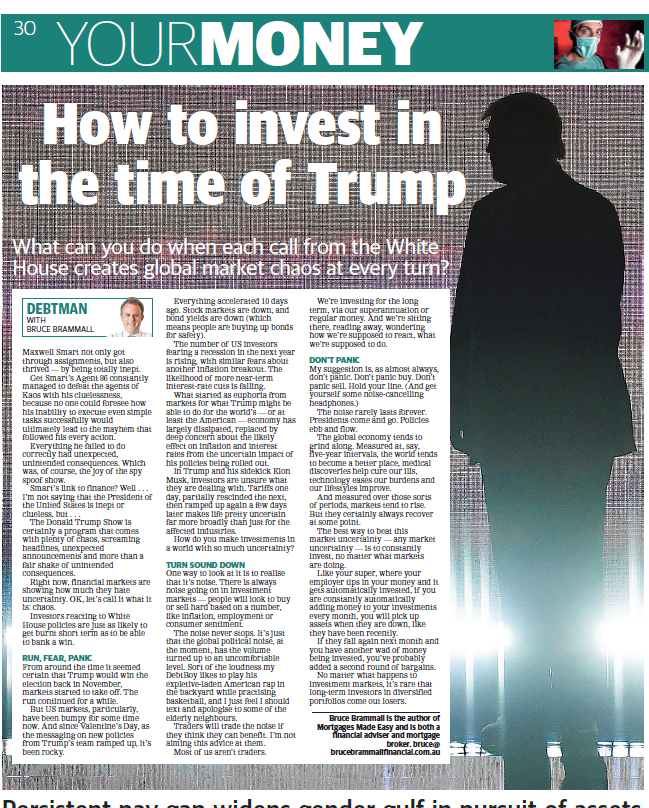
Bruce Brammall, The West Australian, 3 March 2025
Maxwell Smart not only got through assignments, but thrived, by being totally inept.
Get Smart’s Agent 86 constantly managed to defeat the agents of Kaos with his cluelessness, because no-one could foresee how his inability to execute even simple tasks successfully would ultimately lead to the mayhem that followed his every action.
Everything he failed to do correctly had unexpected unintended consequences. Which was, of course, the joy of the spy spoof show.
Smart’s link to finance? Well … I’m not saying that the President of the United States is inept or clueless, but …
The Donald Trump Show is certainly a program that comes with plenty of chaos, screaming headlines, unexpected announcements and more than a fair shake of unintended consequences.
Right now, financial markets are showing how much they hate uncertainty. Oh, let’s call it what it is. Chaos.
Investors reacting to White House policies are just as likely to get burnt short term as to be able to bank a win.
Run, fear, panic
From around the time it seemed certain that Trump would win the election back in November, markets started to take off. The run continued for a while.
But US markets, particularly, have been bumpy for some time now. And since Valentine’s Day, as the messaging on new policies from Trump’s team ramped up, it’s been rocky.
Everything accelerated 10 days ago. Stock markets down, bond yields are down (which means people are buying up bonds for safety).
The number of US investors fearing a recession in the next year is rising, with similar fears about another inflation breakout. The likelihood of more near-term interest rate cuts is falling.
What started as euphoria from markets for what Trump might be able to do for the world, or at least American, economy, has largely dissipated, replaced by deep concern about the likely impact on inflation and interest rates from the uncertain reality of the impact of his policies being rolled out.
In Trump and his sidekick Elon Musk, investors are unsure what they are dealing with. Tariffs on one day, partially rescinded the next, then ramped up again a few days later makes life pretty uncertain far more broadly than just affected industries.
How do you make investments in a world with so much uncertainty?
Turn sound down
One way to look at it is to realise that it’s noise. There is always noise going on in investment markets – people will look to buy or sell hard based on a number, like inflation, employment or consumer sentiment.
The noise never stops. It’s just that the global political noise, at the moment, has the volume turned up to an uncomfortable level.
Sort of the loudness my DebtBoy likes to play his expletive-laden American rap in the backyard, while practicing basketball … and I just feel I should text and apologise to some of the elderly neighbours.
Traders will trade the noise, if they think they can benefit. I’m not aiming this advice at them.
Most of us aren’t traders. We’re investing for the long term, via our super or regular money. And we’re sitting there, reading away, wondering how we’re supposed to react, what we’re supposed to do.
Don’t panic
My suggestion is, as almost always, don’t panic. Don’t panic buy. Don’t panic sell.
Hold your line. (And get yourself some noise-cancelling headphones.)
The noise rarely lasts forever. Presidents come and go. Policies ebb and flow.
The global economy tends to grind along. Measured at, say, five-year intervals, the world tends to become a better place, medical discoveries help cure our ills, technology eases our burdens and our lifestyles improve.
And measured over those sorts of periods, markets tend to rise. But they certainly always recover at some point.
The best way to beat this market uncertainty – any market uncertainty – is to constantly invest, no matter what markets are doing.
Like your super, where your employer tips your super money and it gets automatically invested, if you are constantly, automatically, adding money to your investments every month, you will pick up assets when they are down, like they have been recently.
If they fall again next month and you have another wad of money being invested, you’ve probably added a second round of bargains.
No matter what happens to investment markets, it’s rare that long-term investors in diversified portfolios come out losers.
Bruce Brammall is the author of Mortgages Made Easy and is both a financial adviser and mortgage broker. E: bruce@brucebrammallfinancial.com.au.
